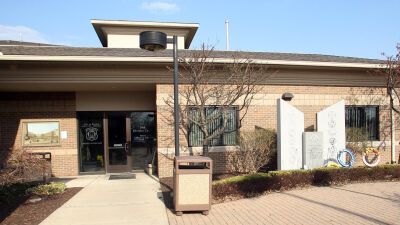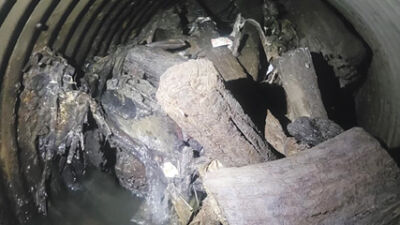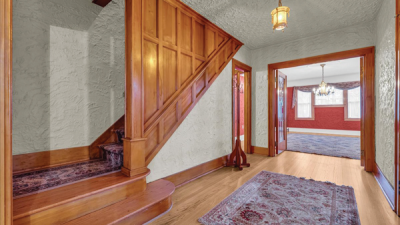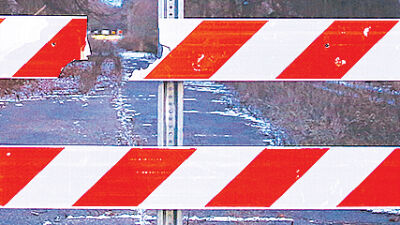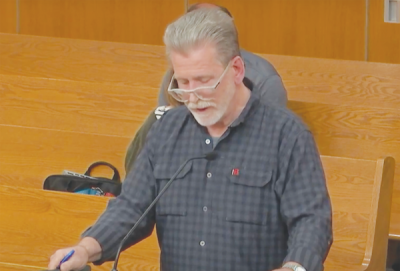
George Westerman provides specific examples of places where the wood chipping service is needed during Clinton Township’s Board of Trustees meeting on April 15.
Screenshot taken from Clinton Township Board of Trustees meeting broadcast
CLINTON TOWNSHIP — At the Clinton Township Board of Trustees meeting on April 15, some residents made it known that they wanted to keep the wood chipping service the township provided.
The discussion started with the announced discontinuation of the Department of Public Service wood chipping service by the board at its Jan. 22 meeting. It came as a recommendation from the township’s Budget Ways & Means Committee. Board members Bob Cannon, Kim Meltzer, Mike Keys and Julie Matuzak voted to end the service; trustee Tammy Patton voted no. The discontinuation is still set for May 13, 2024.
At the April 15 meeting, trustees Patton and Dan Kress led the charge to rescind the service’s discontinuation.
Patton said the money for the service ($250,000) had already been allocated. She said she would have preferred to have the conversation at a meeting of the trustees rather than at the budget ways and means committee meeting.
“People weren’t at budget ways and means,” Patton said. “I think that is something we could’ve opened up here before we abruptly stopped the service, which many people use.”
Following the meeting, Treasurer Paul Gieleghem said the $250,000 figure in the budget for the 2023-24 fiscal year had been reduced to $62,500 for the 2024-25 fiscal year. The money allocated would account for severe weather events. In these cases, the township would be able to still provide the chipping service.
“This is not an elimination of the chipping service,” Gieleghem said. “This is an elimination of chipping service on demand, meaning we have an active program that goes all around the township and picks up anything anybody puts at the curb.”
The members who originally voted to discontinue it at the Jan. 22 meeting wanted to send it back to the committee, following analysis with DPS. This view won the day. Cannon, Meltzer, Gieleghem, Keys and Matuzak voted yes; Patton and Kress voted no.
“The financially responsible thing is not to continue doing it like we were doing it,” Matuzak said. “I would like to see public works come up with a different plan.”
Keys said the overtime costs were often a problem with the service. Prior to the meeting, he said that the township already has it within its GFL refuse contract to put out bundled tree limbs as long as they meet certain requirements.
According to the township’s website, limbs must be cut down to 4 feet in length. These can be tied into bundles not exceeding 50 pounds or they can be put in a 32-gallon container marked as “compost.” Branches from private contractor work are not part of that collection. The branches are picked up on regular trash days.
A firm date has not yet been set for the next committee meeting where the matter will be hashed out. Meetings of Clinton Township’s Budget Ways & Means Committee are open to the public. Meltzer encouraged the public to attend to be heard on the issue.
During public comment, Resident Dana Dugger brought up how Harrison Township offers a similar service.
Harrison Township provides chipping service through its GFL contract once a month, according to its website. Tree branches cannot exceed 2–3 inches in diameter or 12 feet in length.
Resident Donald Aubrey lives on a portion of Moravian with old-growth trees. He stressed the importance of the service in places like this in the township.
“Just in the last two days, I’ve been picking up branches, trying to clean up the area,” Aubrey said. “These are not branches that will fit in any waste management or GFL container. These are huge branches that you need a chipper for.”
George Westerman, a former township superintendent for public works, said the service was used often. Though he said it may have changed in recent years, it still was necessary. He listed numerous spots where large, fallen tree limbs are still an issue. He also said having the service transferred to a contractor like GFL would be a greater cost to the township.
“We choose to live in Clinton Township because of the amenities that are here,” Westerman said.
Trustees and residents said the service could include better restrictions to limit abuse.
“If there is someone who is abusing the process, well, don’t sit there and come after a resident who’s paying close to $8,000 in property taxes,” Aubrey said. “Go after the person or company that’s abusing it.”
Patton said there was a contractor that was known to abuse the township-provided service. She said these abuses should be reined in.
“It has to be better managed,” Patton said. “But to eliminate it completely, that’s not fair.”
Supervisor gives update on explosion investigation
At the April 15 meeting, Cannon said that the investigation for the field portion of the March 4 Goo Smoke Shop explosion has been completed by the township’s police and fire departments. He said that was the investigation at the site of the explosion itself. The other part of the investigation, he said, would be wrapped up on April 21.
“The overall investigation is ongoing,” Cannon said. “There are videos to review, financial records to go over and many interviews to conduct. This is the criminal portion of the investigation. We will be updating the prosecutor with what we have.”
Cannon said patience is needed to make sure the investigation is done right.
“This might seem like an eternity to the public, and to the board, but the most important priority is that we investigate completely and properly,” Cannon said.
Garden to honor indigenous communities
The board also approved a new garden honoring the region’s indigenous history on April 15. The garden will be at the Civic Center in Clinton Township, between Romeo Plank Road and the pond.
“We want to ensure that, before the project is begun, the funding is in place,” Cannon said.
Following some discussion between Cannon and Keys, the motion was amended and unanimously approved to not start construction until funding is in place.
Nethanya Fonseka, a sophomore at the International Academy of Macomb, had the idea for the garden. In a history class, her classmates were doing papers or making plaques for a land acknowledgment project, but she thought more could be done.
“I thought we could do a living, tangible memorial for the native people that occupy these lands,” Fonseka said at the meeting.
 Publication select ▼
Publication select ▼





